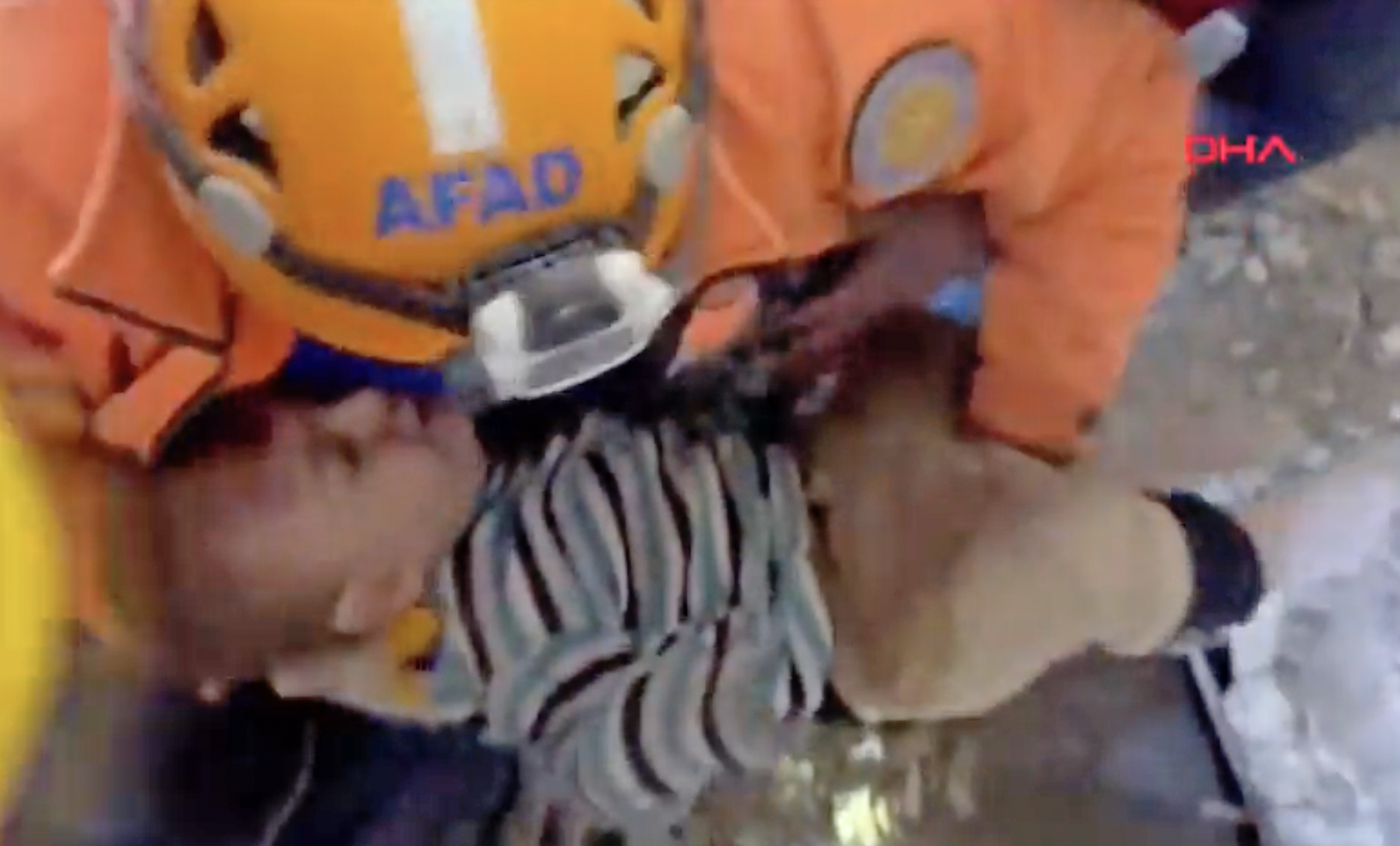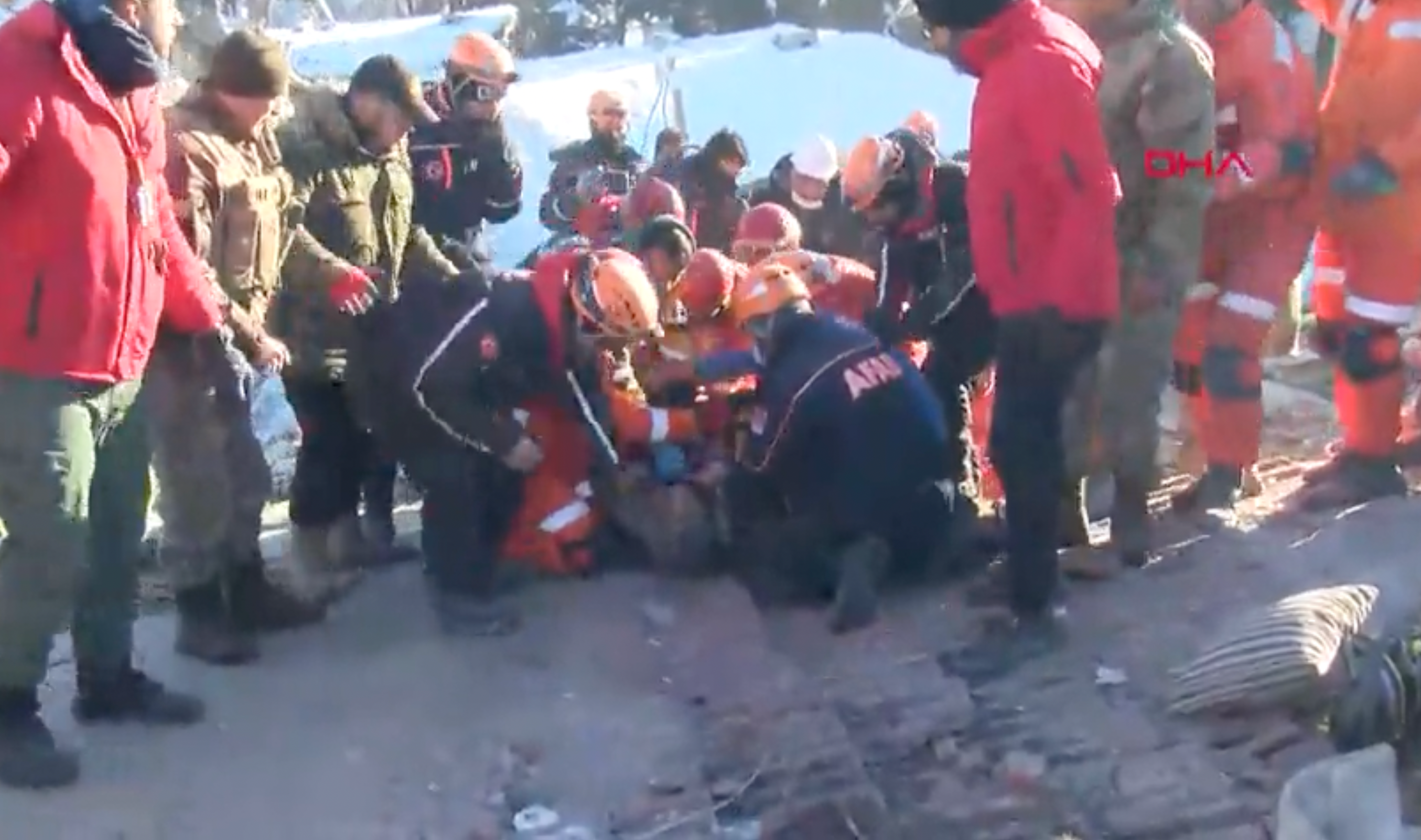
A two-year-old boy has been pulled from the wreckage of a destroyed building in Turkey, 78 hours after the earthquake that devastated large swathes of the country.
The toddler was pulled from the wreckage of a four-floor apartment building in the Odabası district in the city of Antakya. A Romanian and Polish rescue team worked a small gap between some collapsed concrete and lifted the boy to safety as he wept.
The child, identified as Mehmet Tatar, was handed to health workers and put into an ambulance to be taken away for a medical check. The boy’s unlikely escape prompted tears of joy from the rescue team.
Emergency crews working through the night in Antakya were able to save a young girl, Hazal Guner, from the ruins of a building, and also rescued her father, Soner Guner, two hours later, news agency IHA reported. As they prepared the man to be put in an ambulance, rescue crews told him his daughter was alive and they were taking him to the same field hospital for treatment. “I love you all,” he faintly whispered to the rescue team.
Elsewhere, a woman was rescued from the rubble of an apartment building in the Turkish city of Malatya, about 250 miles north of Odabasi, having also been trapped since the first earthquake struck early on Monday, measuring magnitude 7.8.
Follow the latest in our live blog here
Meral Nakir, 60, was pulled from the first floor of what had been by a six-story building with the help of a rescue dog, Kopuk. The dog reacted to the sounds being made by Ms Nakir, allowing a rescue team from disaster management agency AFAD to make contact.
After clearing rubble for more than 20 hours – with soldiers, police, medical teams, AFAD, fire brigades and health teams all taking part in the effort – a hole was then drilled to the area where Ms Nakir was trapped. After being carried by volunteers to safety, she was taken to the hospital by ambulance for medical treatment.
Kopuk – who was brought more than 300 miles from the city of Van to Malatya – has helped rescue six people so far, four of whom from the same building.

Abdulalim Muaini, whose leg had become trapped under concrete, was recused from Hatay late on Tuesday after hours of work to free him. Mr Muaini is of Syrian origin, from Homs. An area that also felt the devastating force of the earthquakes. Reuters reported that he had fled the Syrian civil war and married Esra, a Turkish woman. The couple had two daughters, Mahsen and Besira. When he was eventually pulled from the rubble, there were three bodies nearby covered in blankets. Esra, Mahsen, and Besira, all had died.
The combined death toll in Turkey and Syria neared 20,000 on Thursday evening, as rescue hopes faded with the passing of the 72-hour window. However, the search is set to continue into Friday.
The death toll in Turkey has reached 17,134, DFAD said.

In the devastated Syrian town of Jandaris, Ibrahim Khalil Menkaween walked in the rubble-strewn streets clutching a folded white body bag. He said he had lost seven members of his family including his wife and two of his brothers.
“I’m holding this bag for when they bring out my brother, and my brother's young son, and both of their wives, so we can pack them in bags,” he told Reuters. “The situation is very bad. And there is no aid.”
Syria’s infrastructure has been wrecked by the long civil war, hampering relief efforts after the natural disaster. A number of cities in the opposition-held northwest have faced years of bombardment from president Bashar al-Assad’s forces.
“There are a lot of people under the rubble, there is no heavy equipment to pull them out and the voluntary teams are not able to work with light equipment,” Tousef Nahas, a resident of Salqeen in northwest Syria, told Reuters.
The first UN aid trucks to enter the rebel-held region arrived from Turkey on Thursday morning.
El-Mostafa Benlamlih, the senior UN aid official in Syria, said 10.9 million people had been affected by the catastrophe in the northwestern governorates of Hama, Latakia, Idlib, Aleppo and Tartus.
The UN secretary-general Antonio Guterres pushed for more humanitarian access to northwest Syria, saying he would be “very happy” if the United Nations could use more than one border crossing to deliver aid.
However, the Syrian government views the delivery of aid from Turkey to the rebel-held area as a violation of its sovereignty.
In Turkey, meanwhile, there have been complaints over the lack of equipment and expertise on hand to rescue those trapped in the ruins. The main road into the Turkish city of Antakya was also clogged with traffic as residents who had managed to find scarce gasoline sought to leave the disaster zone and aid trucks headed into the area.
Turkish officials say some 13.5 million people were affected in an area spanning roughly 280 miles from Adana in the west to Diyarbakir in the east. In Syria, people were killed as far south as Hama, more than 100 miles from the epicentre.






